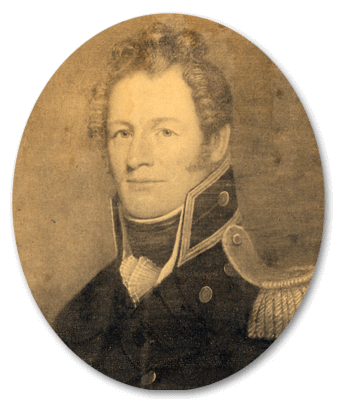Ship's Crew

John Percival
Rank(s): Captain
Dates of Service: 12/13/1843 - 10/5/1846
Birth Date: 4/3/1779
Death Date: 9/7/1862
Born in West Barnstable, Massachusetts on April 3, 1779, Percival received only nine months of formal education. He went to sea as an adolescent and made at least one voyage to Africa. He enlisted in the U.S. Navy as a master’s mate, and in 1800 was warranted a midshipman aboard USS Delaware. When the Quasi-War with France ended, he was discharged and rejoined the merchant service. Later, in 1809, he secured a warrant as sailing master in the navy. In 1813, he served with the New York flotilla and, while commanding Gunboat 6, captured the British tender Eagle. He then served on the sloop-of-war Peacock when, on April 28, 1814, she conquered the British brig-sloop Epervier. The victory earned Percival a lieutenant’s commission and a Congressional sword. In 1825, he sailed on the schooner Dolphin for the Pacific to recover mutineers from the whaleship Globe. Percival returned home in April 1827, and for the next 11 years remained in Boston. In 1838, he sailed the sloop Cyane to the Mediterranean. He was promoted to captain in September 1841.
Percival took command “Old Ironsides” in 1843. He repaired the ship and, in May 1844, began her circumnavigation cruise. Percival sailed first to Madeira, Portugal, then southwest across the equator to Rio de Janeiro, Brazil. The ship proceeded around the Cape of Good Hope and called at Madagascar and at Zanzibar before crossing the Indian Ocean. Following a call at Sumatra, Constitution arrived at Singapore, where the crew’s host was Commodore Henry Ducie Chads, who had surrendered the frigate HMS Java to Constitution on December 29, 1812. The island of Borneo was the next stop, where Percival attempted unsuccessfully to obtain coaling rights for the new and growing U.S. Navy. Percival attempted to free a French missionary bishop allegedly threatened with execution in Cochin China (present-day Vietnam). His strong-arm tactics were unsuccessful and soured relations with the Cochin China (Vietnamese) government for years. In China, Percival cleared up some administrative problems surrounding the American naval store there, then visited Manila before heading across the Pacific. At Honolulu, he learned of the likelihood of war with Mexico and received orders to report to the Pacific Squadron.
Percival found Commodore John Sloat at Mazatlan, Mexico, and was detained there in case of war until April 1846. When he finally secured his release, Percival headed south around Cape Horn; the final leg of the trip was without incident. Constitution reached Boston on September 27, 1846. She was decommissioned shortly thereafter, and Percival, the ship’s oldest captain at age 67, went ashore.
Despite his frequent requests for further active service, Percival had reached the end of his career and was placed on the reserve list in 1855. He died on September 7, 1862 and was buried in Barnstable, Massachusetts.
John Percival has had a destroyer (1920) named for him. A second was cancelled, incomplete, at the end of World War II.